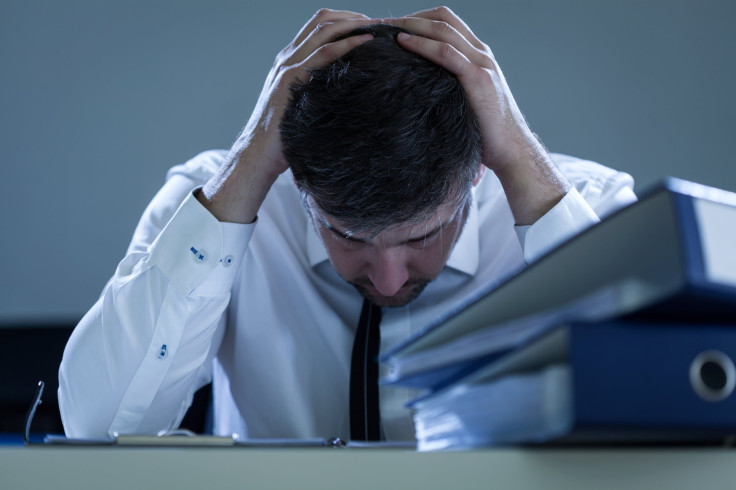Workers With Job Strain Take More Sick Days Due To Mental Illness: How To Reduce Your Work Stress

We already know that stress can impair many daily functions, from the way we socialize to how clearly we think. Stress also has physical effects, increasing our risk for cancer, heart disease, and obesity. It turns out that job stress in particular can have a negative effect on your productivity at work — as a new study points out that high pressure jobs are linked to more sick days and mental illness among workers.
The researchers, out of Karolinska Institutet in Sweden, analyzed data from a Swedish national twin study involving 12,000 workers to see whether there was a link between mental health-related sick leave and high stress at work (referred to as psychosocial factors in the study). Among the 12,000 workers taking sick leave, about eight percent of them did it for mental health reasons; and the majority (three-fourths) of those were women.
The psychosocial factors that go into high stress at work included high demands with little control, as well as low levels of social support at the office. Many of these things you can’t control — but the researchers found, interestingly, that certain workers had protective behaviors that prevented stress from getting out of hand. That included a healthy lifestyle, exercise in particular.
Putting too much of a strain on employees, then, can ultimately backfire. A 2013 study found that moderate workaholics — people who worked hard, not smart — were actually less likely to perform well at their jobs. They placed so much physical and mental strain on themselves that they wore themselves out, resulting in memory, sleep, and stomach problems. The authors point out that lack of recovery time leads to a “breakdown at an emotive or cognitive level.”
So how can you improve your situation at work? The reality is, we will spend most of our time in the office, paying bills, or running errands — but there are ways to work smart rather than hard. Time management can help you focus on one thing at a time without overwhelming yourself. Giving yourself limited time to work on a project will prevent you from procrastinating or wasting time, make you focus harder, and ultimately spend less time on it.
Then there’s sleep. Scheduling in two hours of rest or leisure every evening, booking eight or nine hours of sleep every night, and sticking to it will greatly improve your productivity and decrease stress levels. Proper sleep improves your immune system, memory, cognitive function, and protects you against a lot of chronic diseases.
If being in an office brings you down, go for a half-hour walk every day after lunch, and plan a relaxing physical activity before or after work. Exercise doesn’t always have to be a pain; it can be your allotted time to release tension, take your time, and focus on breathing and meditating. Exercise has been proven repeatedly to be a great way to reduce stress.
“Interventions to reduce sick leave due to mental disorders that focus on improving the psychosocial work environment, especially reducing high psychosocial job demands, may prove effective,” Lisa Mather, an author of the study, writes.
And sometimes those interventions mean changing your work experience, not just adjusting your lifestyle outside of work. Whether that means taking walks, reducing distractions (scheduling time to stay away from the phone, e-mails, or meetings), improving your social connections at work, or simply realizing that not everything is in your control — improving the psychosocial balance at work will help lower those cortisol levels and give you more energy.
At the end of the day, you have to learn that sleep and rest are often more important than working that extra hour. The world is your oyster — but you have to take care of yourself first so you have the physical energy and mental capacity to do your thing.
Source: Mather L et al. Job strain linked to increased sick leave due to mental disorders. Journal of Occupational and Environmental Medicine. 2015.
Published by Medicaldaily.com



























